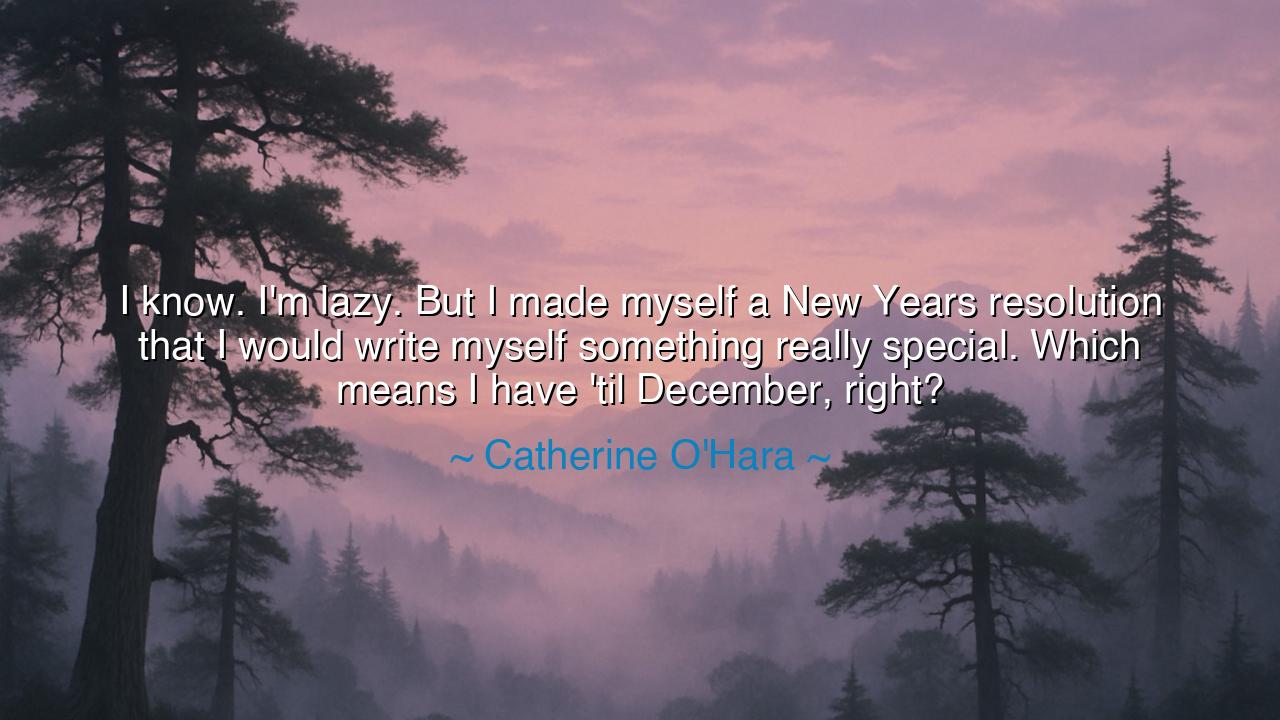
I know. I'm lazy. But I made myself a New Years resolution that
I know. I'm lazy. But I made myself a New Years resolution that I would write myself something really special. Which means I have 'til December, right?






Hear, O children of wisdom and wanderers of time, the playful yet piercing words of Catherine O’Hara: “I know. I’m lazy. But I made myself a New Year’s resolution that I would write myself something really special. Which means I have ‘til December, right?” In these words, spoken with humor, lies not only jest but also a truth about the human heart. For resolutions, like seeds planted in winter, are easy to promise yet hard to nurture, and many delay their tending until the year’s end. What O’Hara cloaks in wit is the eternal struggle of mankind: the tension between intention and procrastination.
The mention of laziness is no shameful confession but a mirror. For who among us has not felt the weight of sloth, the resistance that rises when great tasks call? The ancients themselves knew this foe. The Stoics spoke of akrasia, the weakness of will that prevents us from doing what we know is right. O’Hara, with laughter, admits to what sages lamented: that the spirit is willing, but the hand delays. Yet she transforms this failing into humor, turning self-reproach into a jest that resonates with all who hear.
Consider the New Year’s resolution, that ancient ritual of renewal. It is a vow to one’s future self, a declaration that the coming year shall not be squandered as the last. Yet how often are these vows broken? Gymnasiums swell in January and empty in March; journals are begun and then abandoned; promises to write, to create, to grow are carried like banners at dawn but dropped before noon. O’Hara’s words remind us that while we may laugh at this cycle, it is also a sign of our constant striving—our desire to become better, even when we falter.
Her promise to write something special for herself reveals another truth: that the greatest gift one can create is not always for others, but for one’s own soul. This is no selfish act, but a recognition that the well must be filled if it is to give water to others. Just as an artist must sometimes create without commission, and a warrior must sometimes train without battle, so too must each of us craft something precious for our own growth, our own joy. O’Hara’s humor disguises this wisdom: the act of self-gifting is sacred.
History gives us many examples of delayed greatness. Leonardo da Vinci, though hailed as a genius, was notorious for unfinished works. Commissions were begun and set aside, inventions sketched but never built. Yet within this “laziness” lay a restless mind, always seeking perfection, always promising itself “later.” And though many projects remained incomplete, what he did finish reshaped art and science forever. So too, perhaps, with our own resolutions: even if December is the last hour, if the vow is fulfilled, its power remains.
Thus the quote is more than humor—it is a parable. It tells us that while we laugh at our procrastination, we must not abandon the vow itself. Delay is dangerous, but despair is worse. A resolution carried to December still bears fruit, and a work begun late may still shine brighter than one never attempted. O’Hara, with jesting words, invites us to forgive our slowness, yet also to remember that the true failure is not delay, but surrender.
So the lesson is clear: when you make a vow, especially a vow to yourself, hold it with patience, even if you stumble. Laugh at your laziness, but do not let it rule you. Treat your resolutions not as chains but as torches—if dropped, they may be lifted again. And let each person gift themselves something special, for in honoring one’s own soul, one finds strength to honor others. Whether in January or December, what matters most is that the promise, once made, is finally kept.






AAdministratorAdministrator
Welcome, honored guests. Please leave a comment, we will respond soon